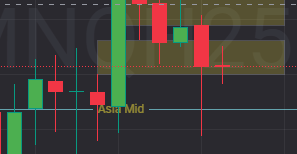Funded Trading in the UK has become a popular way for traders to access the financial markets without the need for significant capital. Funded trading involves traders being given access to a trading account with a set amount of capital, provided by a third-party funding provider. The trader then uses this capital to trade the financial markets, with the aim of generating profits for both themselves and the funding provider.
The popularity of funded trading has grown significantly in recent years, with many traders attracted to the potential for high returns without the need for significant upfront investment. The UK has become a hub for funded trading, with a number of funding providers based in the country offering their services to traders around the world.
However, it is important to note that funded trading is not without its risks. Traders must demonstrate their ability to trade profitably in order to receive ongoing funding, and failure to do so can result in the loss of the trading account. As such, it is important for traders to fully understand the risks involved before embarking on a funded trading journey.
Overview of Funded Trading
Definition of Funded Trading
Funded trading is a concept that allows traders to trade with a significant amount of capital provided by a third party. This means that traders do not need to use their own funds to start trading. Instead, they can access the capital provided by the funding company and keep a percentage of the profits they make from their trades. Funded trading has been gaining popularity in recent years, particularly among new traders who do not have sufficient funds to start trading on their own.
History of Funded Trading in the UK
The concept of funded trading has been around for many years, but it has only become popular in the UK in recent years. The first funded trading company in the UK was established in 2010, and since then, the industry has grown rapidly. Today, there are many funded trading companies in the UK that offer traders the opportunity to access significant amounts of capital and trade in various financial markets.
Funded trading has become popular in the UK due to the high costs associated with trading, such as brokerage fees and the cost of accessing real-time market data. By providing traders with access to significant amounts of capital, funded trading companies can help traders overcome these costs and start trading with confidence.
Overall, funded trading is an attractive option for traders who do not have sufficient funds to start trading on their own. With the help of a funded trading company, traders can access significant amounts of capital and trade in various financial markets.
Key Funded Trading Models in the UK
Proprietary Trading Firms
Proprietary trading firms (PTFs) are companies that provide funding to traders who wish to trade with the firm’s capital. In return, the traders share a portion of their profits with the firm. PTFs typically use a performance-based evaluation system to determine the trader’s profitability. This means that traders who make consistent profits are given more capital to trade with, while those who do not meet the firm’s performance standards may be asked to leave.
One of the benefits of trading with a PTF is that traders can access larger amounts of capital than they would be able to on their own. Additionally, PTFs often provide traders with training and support, which can be valuable for those who are new to trading.
Retail Trader Funding Programmes
Retail trader funding programmes are another option for traders who are looking for funding. These programmes are typically offered by third-party companies and provide traders with the opportunity to trade with the company’s capital. In return, traders share a portion of their profits with the company.
Retail trader funding programmes may have different requirements for traders, such as a minimum level of experience or a specific trading strategy. Traders who are accepted into the programme may receive training and support from the company, as well as access to additional capital as they demonstrate their profitability.
Overall, both proprietary trading firms and retail trader funding programmes can provide traders with access to additional capital and support. However, it is important for traders to carefully research and evaluate these options before committing to a particular programme.
Regulations Governing Funded Trading
Funded trading is a popular way for traders to gain access to capital and earn profits without having to use their own money. However, it is important to note that there are regulations in place that govern funded trading in the UK.
Financial Conduct Authority (FCA) Guidelines
The Financial Conduct Authority (FCA) is the regulatory body responsible for overseeing financial markets in the UK. The FCA has issued guidelines for firms that offer funded trading programs to ensure that they are operating in a fair and transparent manner.
One of the key requirements of the FCA guidelines is that firms must provide clear information about the risks involved in funded trading. This includes information about the potential losses that traders may incur and the fees that they will be charged.
Firms must also ensure that traders have the necessary knowledge and experience to participate in funded trading programs. This may involve conducting assessments or requiring traders to complete training courses before they can start trading.
MiFID II Compliance
The Markets in Financial Instruments Directive (MiFID) is a set of regulations that govern financial markets in the European Union. MiFID II, which came into effect in January 2018, introduced new requirements for firms that offer funded trading programs.
Under MiFID II, firms must provide traders with clear and accurate information about the risks and costs associated with funded trading. This includes information about the leverage that is available and the potential losses that traders may incur.
Firms must also ensure that traders have the necessary knowledge and experience to participate in funded trading programs. This may involve conducting assessments or requiring traders to complete training courses before they can start trading.
In conclusion, traders who are interested in funded trading in the UK should be aware of the regulations that govern this type of trading. By following these regulations, firms can ensure that traders are protected and that they are operating in a fair and transparent manner.
Selecting a Funded Trading Programme
When it comes to selecting a funded trading programme in the UK, there are several factors to consider. This section will explore the criteria for choosing a provider and compare some of the top UK funded trading programmes.
Criteria for Choosing a Provider
Before selecting a funded trading programme, it is important to consider the following criteria:
- Funding: Look for a provider that offers sufficient funding to meet your trading goals. Some programmes may offer different funding levels, so make sure to choose one that suits your needs.
- Fees: Check for any fees associated with the programme, such as monthly fees or profit sharing. Be aware that some programmes may charge higher fees for higher funding levels.
- Trading rules: Understand the trading rules of the programme, including maximum drawdown limits, profit targets, and risk management guidelines. Make sure the rules align with your trading style and goals.
- Support: Look for a provider that offers adequate support, such as training, coaching, and mentorship. This can help you improve your trading skills and increase your chances of success.
- Reputation: Research the reputation of the provider, including reviews from other traders. Choose a provider with a good track record of success and positive feedback from traders.
Comparison of Top UK Funded Trading Programmes
Here are some of the top UK funded trading programmes and their key features:
| Provider | Funding | Fees | Trading Rules | Support | Reputation |
|---|---|---|---|---|---|
| TopstepFX | Up to $500,000 | Monthly fee + profit sharing | Maximum drawdown limit, profit target, risk management | Coaching, trading community | Positive reviews from traders |
| FTMO | Up to €200,000 | Monthly fee + profit sharing | Maximum drawdown limit, profit target, risk management | Trading psychology course, mentorship | Positive reviews from traders |
| City Traders Imperium | Up to £2,000,000 | Monthly fee + profit sharing | No maximum drawdown limit, profit target, risk management | Trading psychology course, mentorship | Positive reviews from traders |
It is important to note that this is not an exhaustive list and there may be other funded trading programmes available in the UK. Traders should carefully consider their options and choose a provider that best meets their needs and goals.
Risk Management in Funded Trading
Funded trading is a popular way for traders to access capital without having to risk their own funds. However, like any form of trading, there are risks involved. Effective risk management is crucial to the success of a funded trader. This section will explore common risks and mitigation strategies, as well as the role of risk management in trader evaluation.
Common Risks and Mitigation Strategies
One of the most significant risks in funded trading is the risk of losing the capital provided by the funding company. To mitigate this risk, traders should have a well-defined trading plan that includes clear entry and exit points, risk management rules, and position sizing guidelines. Traders should also have a solid understanding of the markets they are trading and be aware of any potential news or events that could impact their positions.
Another common risk in funded trading is the risk of overtrading. Overtrading can lead to excessive losses and can quickly deplete a trader’s account. To mitigate this risk, traders should have strict rules around the number of trades they take each day or week and should only take trades that meet their predefined criteria.
Risk management should also include the use of stop-loss orders. Stop-loss orders can help limit losses and protect a trader’s account from significant drawdowns. Traders should set stop-loss orders at a level that is appropriate for their trading strategy and risk tolerance.
Role of Risk Management in Trader Evaluation
Risk management is a critical factor in trader evaluation. Funded trading companies will typically evaluate a trader’s risk management skills before providing them with funding. Traders who demonstrate a solid understanding of risk management principles and who have a proven track record of managing risk effectively are more likely to receive funding.
Traders who are funded will also be evaluated on an ongoing basis. Funded trading companies will monitor a trader’s risk management performance and may adjust their funding levels based on their performance. Traders who consistently manage risk effectively are more likely to receive additional funding and may even be considered for a proprietary trading role.
In conclusion, effective risk management is essential for success in funded trading. Traders should have a well-defined trading plan, be aware of the risks involved, and use appropriate risk management strategies to protect their accounts. Risk management is also a critical factor in trader evaluation, and traders who demonstrate a solid understanding of risk management principles are more likely to receive funding and be successful in funded trading.
Success Stories and Challenges
Case Studies of Successful UK Traders
Funded trading has provided opportunities for many traders in the UK to achieve success in the financial markets. One such success story is that of John Smith, who started trading with a funded account of £50,000. He was able to consistently generate profits and was eventually given a larger account of £250,000 to trade with. His success was attributed to his disciplined approach to risk management and his ability to adapt to changing market conditions.
Another trader, Sarah Jones, was able to turn her passion for trading into a successful career through funded trading. She started with a £25,000 account and was able to grow it to over £100,000 within a year. Her success was due to her ability to identify profitable trading opportunities and her willingness to learn from her mistakes.
Challenges Faced by New Traders
While funded trading can provide opportunities for success, it also comes with its own set of challenges. One of the biggest challenges faced by new traders is the pressure to perform. New traders may feel that they have to generate profits quickly in order to prove their worth and secure additional funding. This pressure can lead to impulsive trading decisions and can ultimately result in losses.
Another challenge faced by new traders is the need to develop a trading strategy that is both profitable and consistent. This requires a deep understanding of the financial markets and the ability to analyze market data effectively. New traders may also struggle with risk management, which can lead to excessive losses and the depletion of their trading accounts.
In conclusion, funded trading has provided opportunities for many traders in the UK to achieve success in the financial markets. However, new traders must be aware of the challenges they may face and work to develop the skills and strategies necessary to overcome them. With discipline, patience, and a willingness to learn, new traders can achieve success in funded trading.
Future of Funded Trading in the UK
Emerging Trends
Funded trading in the UK has been gaining popularity in recent years, and there are several emerging trends that are likely to shape its future. One of the most significant trends is the increasing use of automation and artificial intelligence (AI) in trading. This is expected to lead to more efficient and accurate trading strategies, as well as increased profitability for traders.
Another emerging trend is the growing interest in sustainable and socially responsible investing. As investors become more conscious of the impact of their investments on the environment and society, there is a growing demand for trading firms that incorporate environmental, social, and governance (ESG) factors into their investment strategies.
Potential Market Developments
Looking ahead, there are several potential market developments that could have a significant impact on the future of funded trading in the UK. One of the most significant is the ongoing Brexit negotiations and the impact that they may have on the financial services industry in the UK.
Another potential development is the increasing use of cryptocurrencies and blockchain technology in trading. While this is still a relatively new area, there is growing interest in the potential of blockchain to revolutionize the way that financial transactions are conducted.
Overall, the future of funded trading in the UK looks bright, with a range of emerging trends and potential market developments that are likely to shape the industry in the coming years. As technology continues to evolve and investors become more conscious of the impact of their investments, the industry is likely to become ever more sophisticated and innovative.





